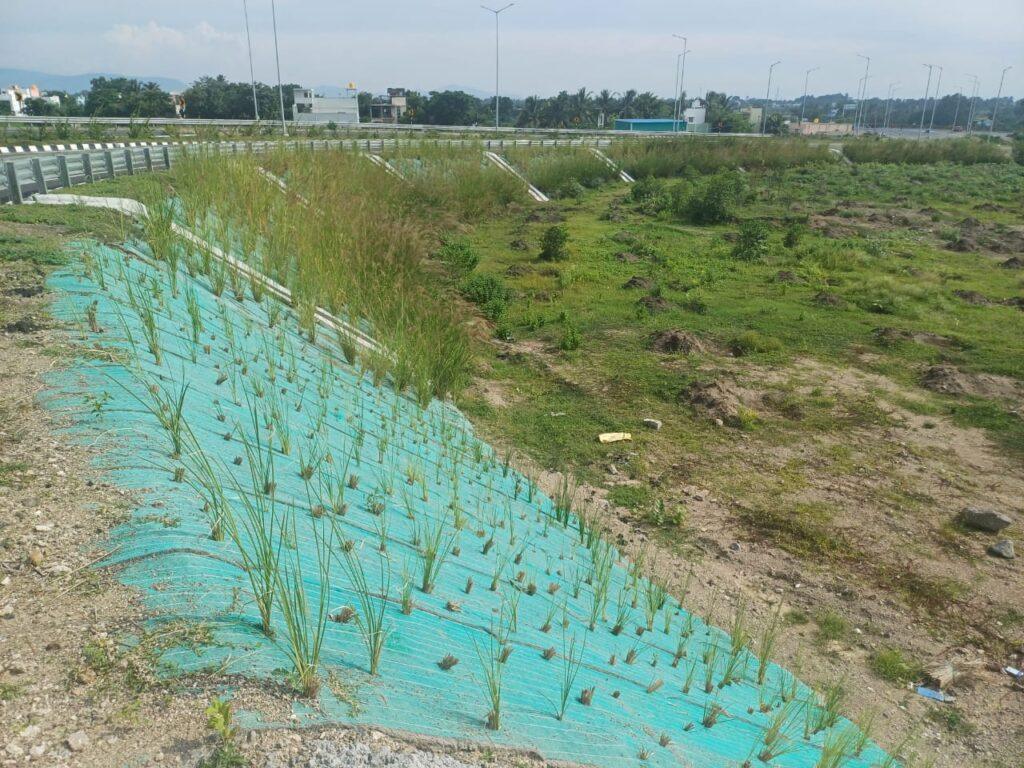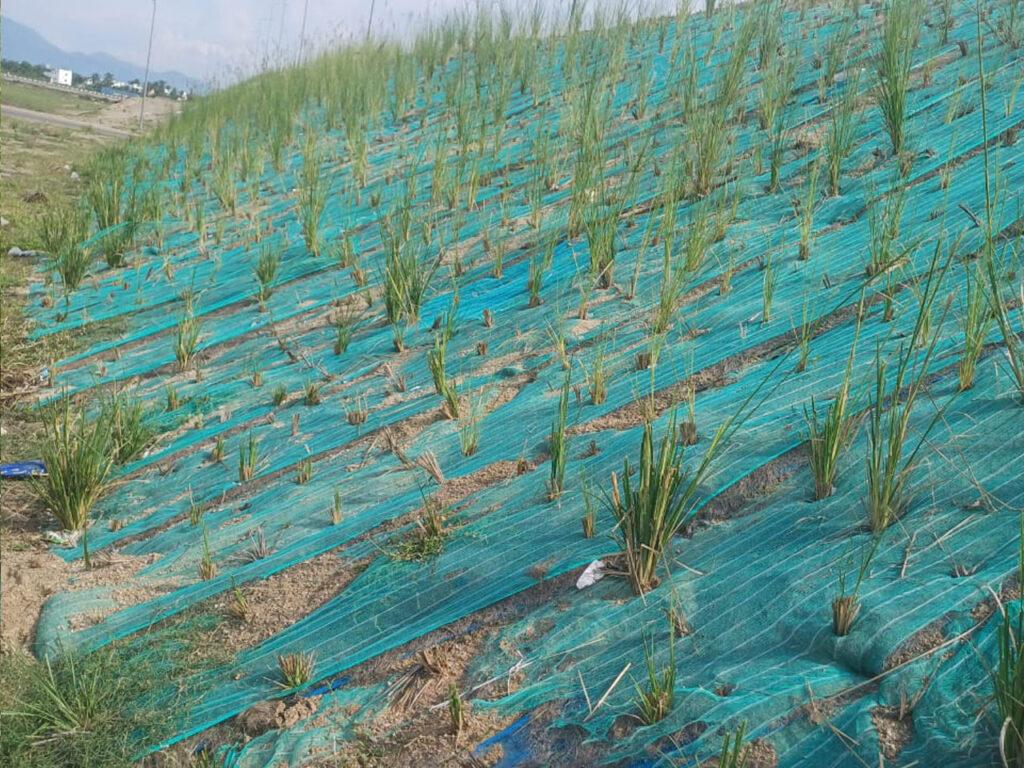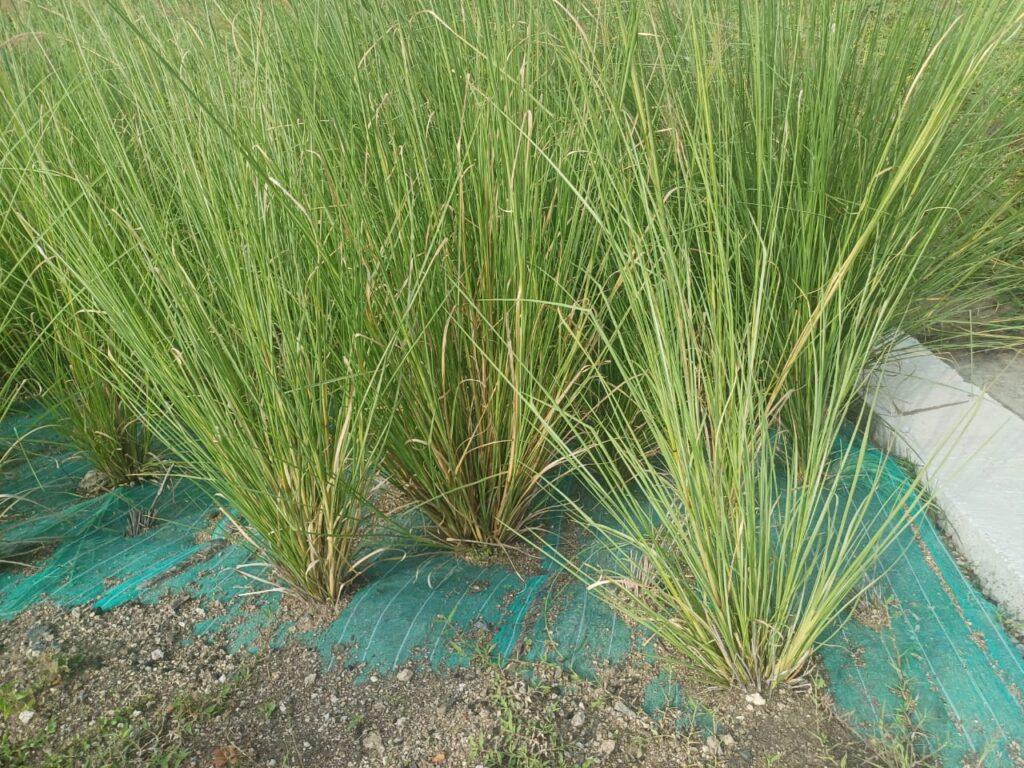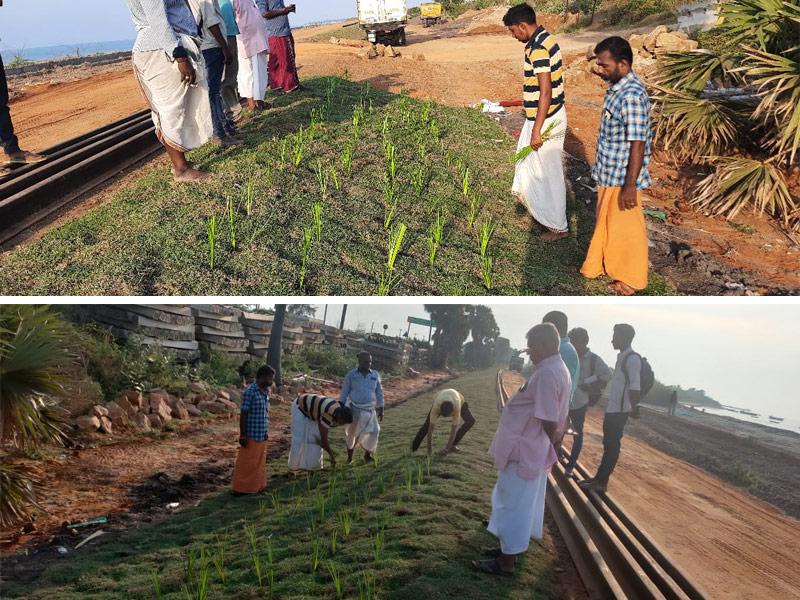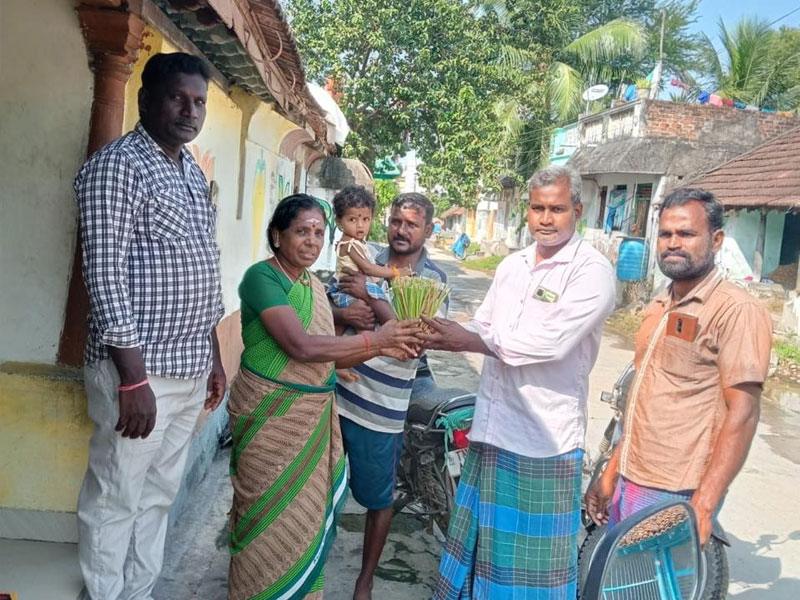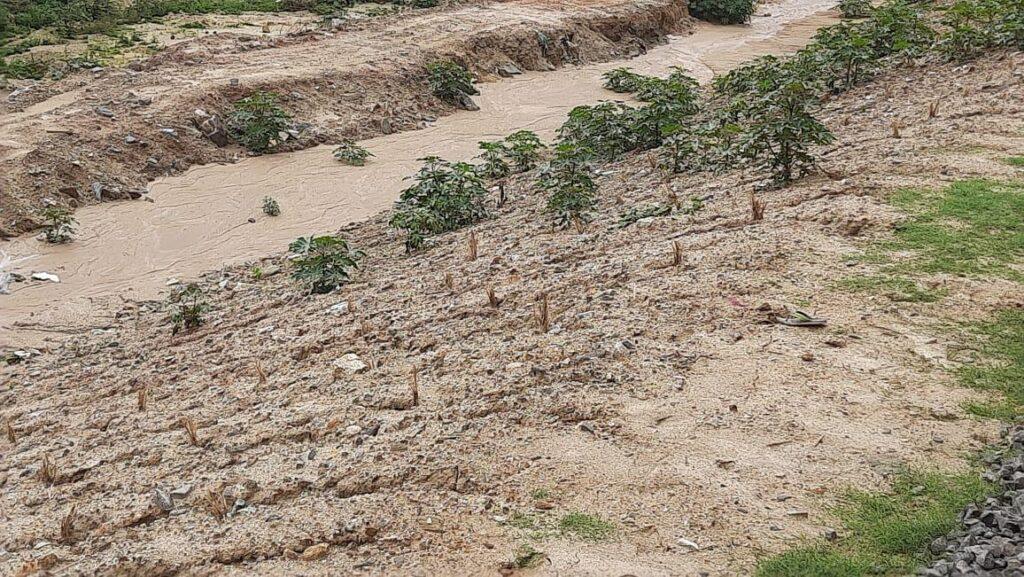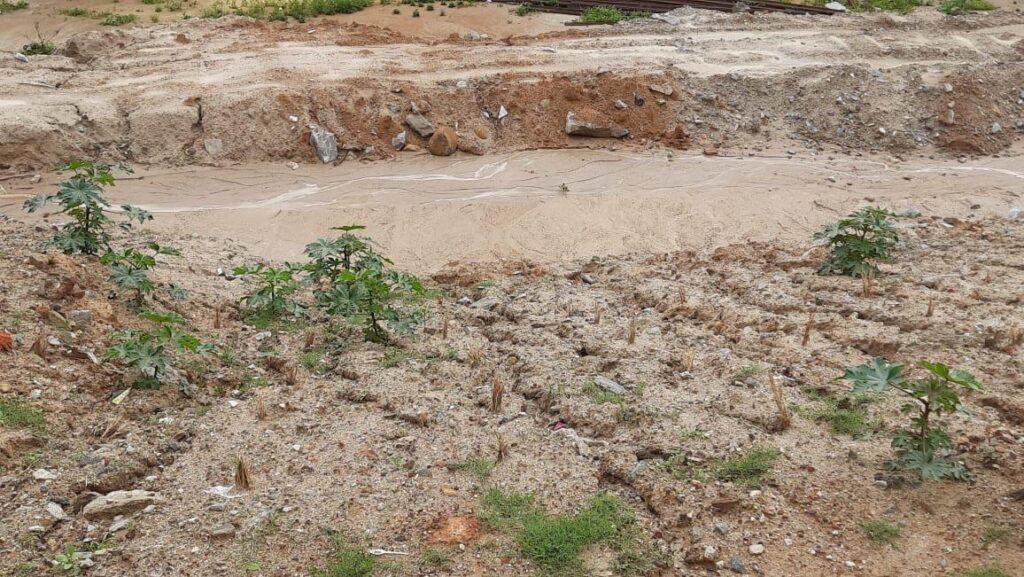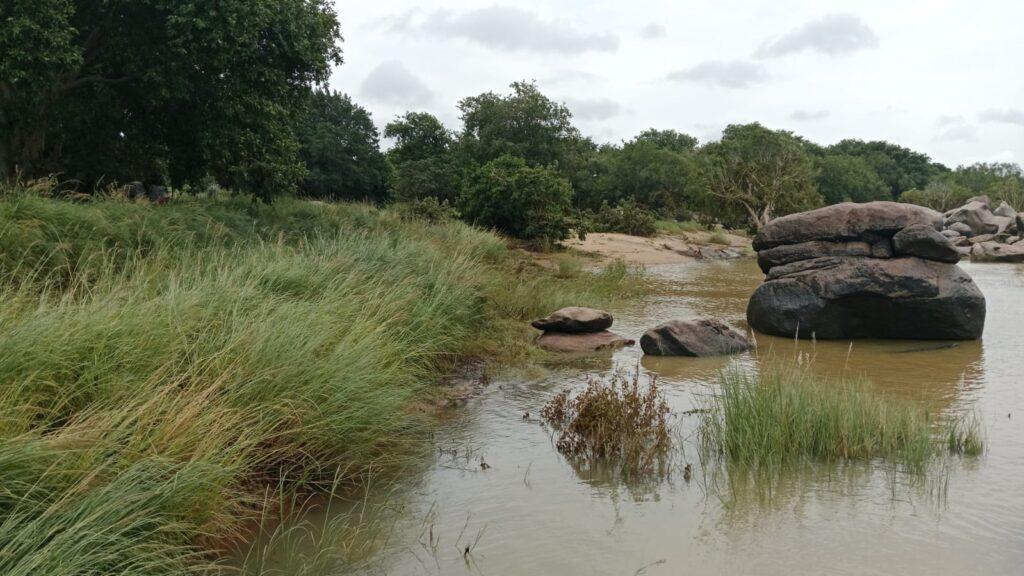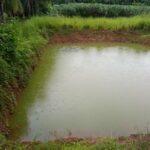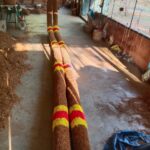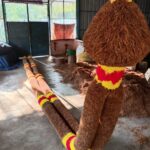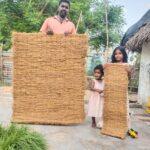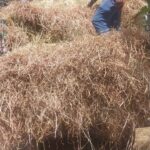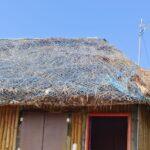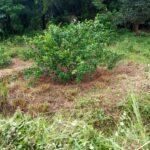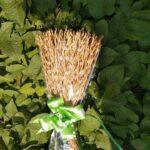Launch of India Vetiver Foundation (IVF)
The India Vetiver Foundation (IVF) has been officially launched with the mission to promote sustainable practices using vetiver-based solutions. This foundation aims to harness the unique properties of vetiver for environmental protection, community upliftment, and bioengineering innovations. India Vetiver Foundation is registered as a Section 8 company under the Companies Act, 2013, in India. This designation is given to non-profit organizations that work towards promoting social welfare, environmental sustainability, and other charitable objectives.
Visit our website: https://vetiver.org.in
Photos Courtesy: Mr. Patanjali Jha
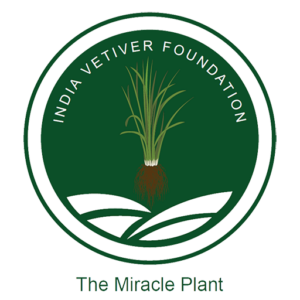
What does India Vetiver Foundation (IVF) do?
IVF is committed to enhancing environmental resilience through vetiver grass. We focus on soil and water conservation, bioengineering for wastewater treatment, and empowering farmers through sustainable practices. Our initiatives prioritize environmental sustainability and community development.
India Vetiver Foundation is backed by a powerful team of experts and industry leaders, each with invaluable experience to contribute to this transformative initiative.
Photos Courtesy: Mr. Patanjali Jha
Carbon Status of Indian Soils: An Overview
Restoring soil health through effective Soil Organic Carbon (SOC) management is a critical challenge, particularly for tropical soils in India. Intensive agricultural practices have led to the accelerated decomposition of SOC, depleting soil fertility and releasing carbon into the atmosphere. This process significantly contributes to greenhouse gas emissions, making it a pressing global and national concern.
Climate change, with rising temperatures and declining rainfall in parts of India, threatens the health of tropical soils. The arid climate accelerates soil degradation, leading to organic carbon depletion, calcium carbonate buildup, and increased salinity/sodicity, posing significant challenges for Indian agriculture.
To sustain soil health in India’s changing climate, restoring organic carbon (OC) and expanding the soil carbon pool through effective management strategies is crucial. However, climatic challenges will increase resource demands for achieving target yields, potentially slowing down soil rehabilitation efforts.
Please read this in-depth research paper on Carbon Status of Indian Soils: Bhattacharyya, T., Par, D. K., Chandran, P., Ray, S. K., Mandal, C., Wani, S. P., & Sahrawat, K. L. (2011). Carbon Status of Indian Soils : An Overview. National Bureau of Soil Survey & Land Use Planning, Indian Council of Agricultural Research, Amravati Road, Nagpur, Maharashtra; International Crop Research Institute for Semi-arid Tropics, Patancheru, Andhra Pradesh.
This research paper provides an in-depth analysis of the importance of soil carbon and the critical need to maintain its balance for soil health and sustainability.
The decline of Soil Organic Carbon (SOC) levels in India is a pressing concern for agricultural sustainability. Over the past seven decades, SOC content has plummeted from approximately 1% to a mere 0.3%, adversely affecting soil fertility and structure. Consider reading this piece: The Soil Organic Carbon (SOC) content has come down to 0.3 – 0.4 per cent in the country. It is well below the acceptable limit and is a cause for concern – The Hindu.
Photos Courtesy: Rameswaram Vetiver Sreeram
This reduction compromises the soil’s water retention capacity and diminishes its ability to support vital microorganisms essential for nutrient cycling. Read more on this: Soil Organic Carbon (SOC) content in India has fallen from 1% to 0.3% in the last 70 years, causing concern in the agriculture sector – Krishi Jagran.
Intensive agricultural practices, including the overuse of chemical fertilizers and pesticides, have accelerated this depletion. The lack of organic amendments and continuous cropping without adequate soil rest further exacerbate the problem, leading to degraded soil health and reduced crop yields.
Vetiver grass (Chrysopogon zizanioides) has a rich history in soil conservation and sustainable agriculture. In the late 1980s, Richard Grimshaw of the World Bank recognized its potential as a cost-effective alternative to traditional engineering solutions for erosion control. He initiated the Vetiver Network to promote its global application.
Reflecting on its efficacy, Grimshaw noted, “We learnt from these farmers that they have been successfully growing vetiver against soil erosion for centuries.” He further emphasized, “It has taken a long time, but I really feel that now is ‘Vetiver Time’ for India and the world.”
For those interested in his insights and experiences, the following resources are recommended:
“The Role of Vetiver Grass in Sustaining Agricultural Productivity” – In this seminal paper, Grimshaw discusses the unique characteristics of vetiver grass and its effectiveness as a vegetative hedge for erosion control. He highlights its adaptability to various site conditions and its cost-effectiveness compared to traditional engineering solutions.
“Vetiver Grass Technology Networking and Its Impact on the Environment” – This article explores the global dissemination of vetiver grass technology through networking. Grimshaw emphasizes how information exchange has led to widespread adoption of vetiver for environmental solutions, including soil and water conservation, slope stabilization, and land rehabilitation.
“Founder of Vetiver Network International Dick Grimshaw Reminisces Connection Between Vetiver and India” – In this interview, Grimshaw reflects on his experiences in India during the 1980s, where he observed the traditional use of vetiver for erosion control. He discusses the challenges and successes in promoting vetiver technology and its enduring impact on sustainable agriculture.
Vetiver grass is highly effective for environmental applications, including land stabilization, water and soil reclamation, phytoremediation, and carbon sequestration. Its deep, fast-growing roots enhance soil anchoring, absorb pollutants, and mitigate heavy metal contamination. Additionally, its non-invasive reproductive system and low essential oil content make it ideal for ecological plantations (Lavania, 2018). The robust root system of vetiver is essential for nutrient uptake, soil health, and erosion control, making it a key tool in sustainable land management (Smith & Smet, 2012; Jackson, 2001). Read more: Lavania, U. C. (2019). Vetiver root system: A resource for carbon sequestration, soil health, and environmental sustainability. The Vetiver Network International. Retrieved from https://www.vetiver.org
Vetiver System (VS) in India – A Scientific Perspective
The Vetiver System (VS) in India is an innovative, nature-based solution for soil conservation, water management, and climate resilience. It utilizes Chrysopogon zizanioides (Vetiver grass), a deep-rooted, non-invasive species, for soil erosion control, slope stabilization, water purification, and carbon sequestration (Lavania, 2019).
India has been a key adopter of vetiver technology, with its applications spanning agriculture, climate adaptation, and industrial waste management. The National Bureau of Soil Survey & Land Use Planning (NBSSLUP) and ICRISAT have studied its role in phytoremediation, proving its effectiveness in heavy metal absorption and soil organic carbon (SOC) restoration (ICRISAT, 2021).
In recent years, the India Vetiver Network and various state-led afforestation programs have promoted vetiver for:
Watershed Management – Used in riverbank stabilization projects (e.g., the Ganga Rejuvenation Initiative).
Climate Resilience – Deployed in arid regions to combat desertification.
Soil Carbon Sequestration – Proven to increase SOC from 0.3% to nearly 1% under controlled conditions (Lavania, 2019).
Given India’s large-scale land degradation (over 30% of total land area), vetiver presents a cost-effective and sustainable solution to restore degraded ecosystems, enhance soil fertility, and improve agricultural productivity (Grimshaw, 2003).
The slope along the railway track at Pampan is unlike the hilly slope looking down to the railway track on the Konkan railway. On the Pampan slope, there is no water film on the nonexistent rock on the slope on the side of the railway track.
Photos Courtesy: Rameswaram Vetiver
Citations:
Lavania, U.C. (2019). “Vetiver Grass Root System: A Natural Solution for Soil and Water Conservation.” International Journal of Environmental Applications.
ICRISAT (2021). “Phytoremediation and Soil Carbon Enhancement Using Vetiver in Indian Agriculture.” ICRISAT Research Papers.
Grimshaw, R. (2003). “The Vetiver System – A Natural, Green, and Cost-Effective Technology for Sustainable Development.” The Vetiver Network International (TVNI).
Current Applications of Vetiver in India:
Enhancing food forest for vetiver integration
Vetiver grass, when planted around fruit and food crops, enhances their growth by improving soil moisture retention, reducing erosion, and suppressing weed competition. Its deep-root system helps stabilize the soil, while its natural pest-repellent properties create a healthier growing environment for adjacent plants.
Photos Courtesy: Mr. Patanjali Jha
Vetiver in a food and timber forest in Cheyyur, Tamilnadu
Vetiver for Slope Stabilization: A Community-Led Effort in Uttarakhand, Spearheaded by Mr. Patanjali Jha
In a significant initiative to combat soil erosion and landslides, our first vetiver plantation site in Uttarakhand was established in Athali, 9 km from Uttarkashi. Led by Mr. Patanjali Jha, along with 31 dedicated volunteers comprising school and college students, this effort has contributed to stabilizing slopes in the region. With the collective support of this community, over 20,000 vetiver slips have been planted in landslide-prone areas. Additionally, 20,000 slips are being gifted to a scientist from the Govind Ballabh Pant Institute in Almora, with another batch set to be planted in Sikkim at varying altitudes. This initiative marks a crucial step in leveraging vetiver’s potential for environmental restoration in vulnerable terrains.
Photos Courtesy: Mr. Patanjali Jha
Vetiver for Riverbank Protection in Hampi: A Sustainable Collaboration
Our collaboration in southern India, particularly in Hampi, focuses on using vetiver to safeguard river flows and prevent soil erosion. This UNESCO heritage site stands to benefit immensely, as vetiver not only stabilizes riverbanks but also multiplies rapidly—anywhere between ten to forty times. With this natural expansion, we hope that within five years, vetiver will provide comprehensive protection along both sides of the rivers flowing through this historic landscape.
Vetiver: A Natural Shield Against Soil Erosion
Vetiver grass plays a vital role in preventing soil erosion near farms and protecting pond banks from collapse. Its deep, dense roots bind the soil, reducing runoff and stabilizing the land. When planted around ponds, vetiver strengthens the edges, prevents landslides, and maintains water quality. This eco-friendly solution ensures long-term soil and water conservation.
Vetiver Floating Wetlands – A Breakthrough by Dr. K. Sara Parwin Banu
Dr. K. Sara Parwin Banu, Professor of Environmental Sciences at Tamil Nadu Agricultural University, has pioneered Vetiver Floating Wetlands, a cost-effective, eco-friendly solution for restoring lakes, ponds, and water bodies.
Key Benefits:
- Purifies Water – Removes nutrients, metals, organics, and pharmaceuticals.
- Prevents Eutrophication – Reduces algae blooms and improves water quality.
- Boosts Economy – Vetiver roots can be harvested for handicrafts.
- Enhances Biodiversity – Supports native insects and bird populations.
- Improves Aesthetics – Revitalizes urban and rural water bodies.
How It Works: Vetiver grows hydroponically on floating platforms, developing an extensive root system in just three months. These roots biosorb pollutants, filter sediments, and foster microbial biofilms that break down contaminants naturally.
Dr. Parwin Banu’s innovation is transforming lake conservation efforts in India. Let’s applaud her for this remarkable contribution!
Expanding Vetiver’s Potential: Dr. Sara’s Innovation in Sustainable Wastewater Treatment
Dr. Sara is actively exploring innovative applications for Vetiver grass, leveraging its natural properties as an eco-friendly solution for wastewater treatment. At Tamil Nadu Agricultural University (TNAU), she is spearheading research on using Vetiver as a sustainable and cost-effective method for treating sewage and improving water quality. By integrating Vetiver into wastewater management systems, Dr. Sara aims to enhance environmental conservation efforts while promoting a scalable, nature-based solution for sustainable agriculture and urban sanitation.
Mullai Vanam: A Green Revolution in Thirumullaivayal
Exnora Chennai has undertaken a transformative afforestation initiative in Thirumullaivayal SIDCO, near Avadi, Chennai, covering 21 acres. As part of this project, 30,000 trees from 300 diverse species have been planted, creating a thriving green ecosystem.
At the heart of this initiative lies Mullai Vanam, with a special focus on Vazhaivanam (Banana Forest) and the restoration of nine water bodies. To enhance soil stability and water conservation, vetiver is being strategically planted along these water bodies.
This initiative stands as a testament to sustainable urban greening, water conservation, and biodiversity enhancement in Chennai.
Vetiver Nursery Flourishes in Mayapur
A small yet thriving vetiver nursery has been established in Mayapur, West Bengal, under the dedicated care of Mataji Mohini. Serving as a hub for promoting vetiver’s ecological benefits, including soil conservation and water retention, the nursery supports local greening efforts with a strong focus on sustainability. It aligns with the broader vision of environmental stewardship, fostering a healthier ecosystem for the region.
Photo Courtesy: P. N. Subramanian
Rameswaram Vetiver
As part of the CSIR-CIMAP Aroma Mission, a Vetiver plantation has been established near Kallanai Dam on the land of Mr. Poondi S. Venkatesan and within the CSIR-CIMAP Kallanai Cluster. This initiative not only promotes sustainable agriculture but also marks the beginning of an Agro-Tourism venture in the region.
Supported by:
- Mr. Alok Kalra – Chief Scientist at Central Institute of Medicinal and Aromatic Plants
- Mr. Velusamy Sundaresan
- Mr. Sanjay Kumar Rtn – Sr. Pri. Scientist at CSIR-CIMAP
- Ms. Aruna Swaminathan – Advocate
- Mr. V. S. Pragadheesh – Scientist at Central Institute of Medicinal and Aromatic Plants
- Mr. Yogendra N. D. Honnaali
- Mr. Rajesh Verma
- Mr. Poondi Venkatesan
- Mr. APJMJ Sheik Saleem
This collaborative effort aims to enhance rural livelihoods, boost environmental sustainability, and promote eco-tourism opportunities around the historic Kallanai Dam.
Massive Vetiver Garland prepared
Doordarshan Features Rameswaram Sreeram: Innovating Vetiver Agrotourism
Doordarshan, India’s leading national news channel, recently interviewed Rameswaram Sreeram, a pioneering Vetiver entrepreneur. Sreeram is spearheading ambitious plans to integrate Vetiver cultivation with agrotourism, creating a sustainable and immersive experience for visitors. His innovative approach aims to showcase the ecological and economic potential of Vetiver while promoting environmental conservation.
Vetiver Value Addition at Madurai MABIF Incubation
During our visit to Madurai MABIF Incubation, we explored Intensive Vetiver Herbal Care, a product line crafted from 100% natural pure vetiver extract. This innovative approach highlights the immense potential of vetiver in herbal care, showcasing its benefits in sustainable and value-added applications.
Elango’s Vetiver Experiment In Grow Bags
Elango, a dedicated farmer-turned-vetiver grower, is embarking on an ambitious experiment with 2,000 bags of vetiver cultivation. He has prepared approximately 10 acres of land in Kalakkad, Tirunelveli district, with the primary objective of oil extraction. His initiative marks a significant step toward expanding vetiver-based agriculture in the region.
Nochikadu: The Village That Breathes Vetiver
Senthur Velan, a dedicated Vetiver entrepreneur, actively showcases innovative planting, cultivation, and land management practices. He is among many passionate farmers committed to Vetiver farming. The village of Nochikadu is infused with the rich aroma of Vetiver grass, where an entire community thrives on home-based Vetiver handicraft production, with families deeply engaged in preserving this traditional craft.
Cuddalore: A Growing Hub for Vetiver Cultivation
Stretching over 40 km along the seashore from Nochikadu, Cuddalore boasts the largest dedicated acreage for Vetiver cultivation, covering approximately 650 acres. Dr. Ahmed of Biotherm is spearheading efforts to expand this to 2,000 acres, introducing improved agronomy practices and sustainable solutions like solar PV-powered water pumps to replace diesel engines. Farmers in these villages are playing a pioneering role in Vetiver cultivation, focusing on root production and essential oil extraction, setting a benchmark for the industry.
Sustainable Vetiver Roofing at a Farm in Mudaliar Kuppam
Nestled in Mudaliar Kuppam village, Villupuram district, behind Ocean Spray Hotel, on the seashore overlooking the Bay of Bengal, this farm has embraced an age-old yet innovative approach—Vetiver roofing. The Vetiver grass, sourced from Kaddalur and Cheyyur, was meticulously laid by skilled artisans, transforming what is often discarded into a sustainable, value-added asset. Traditionally, Vetiver is chopped and burned every four months, but here, it finds a noble purpose—providing natural insulation, durability, and a connection to eco-conscious living. A fine example of how thoughtful innovation can merge sustainability with tradition!
Vetiver: A Natural Shield for Sustainable Growth
Vetiver grass grown around lemon plants helps retain soil moisture, prevents erosion, and improves soil structure. Its deep roots prevent nutrient loss, creating a healthier environment for lemon plants to thrive. Additionally, vetiver acts as a natural windbreak, shielding the plants from harsh weather conditions.
Vetiver Marketplace: Vetiver Value Added Products
Khus Plaza
Rameswaram Vetiver
Neela Products for Vetiver
Chief Minister Sukhvinder Singh Sukhu Launches Vetiver Pilot to Combat Landslides in Himachal Pradesh
Himachal Pradesh Chief Minister Sukhvinder Singh Sukhu has announced a pilot project to cultivate vetiver grass as a bio-engineering solution to mitigate the state’s increasing landslides. Known for its deep root system, vetiver stabilizes soil and prevents erosion.
As part of this initiative, a total of 35,000 vetiver tillers have been provided—20,000 donated by a CSR partner of IVF FIA Global and 15,000 by Mr. Patanjali Jha. In collaboration with the Vetiver Foundation-Climate Resilience and Sustainability Initiatives (CRSI) in Tamil Nadu, the Himachal Pradesh State Disaster Management Authority (HPSDMA) has planted 1,000 vetiver saplings in a nursery at Berti village, Solan district. Initial results show high survival rates and adaptability, indicating potential for wider application in landslide-prone areas.
Upcoming Vetiver Award Function
Manava seva dharma samvardhani (MSDS) awards & fellowship 2025
A charitable trust for the protection of social consciousness
The MSDS Awards and Fellowship 2025 recognizes individuals who have demonstrated outstanding commitment to social impact and environmental sustainability.
Karmayogi P. N. Devarajan Awards 2025
Honoring exemplary leadership and contributions, this year’s recipients are:
- Shri S. Kamalanathan – K H International, Puducherry – Kamalanathan is a succesful grower of Vetiver near Pondichery. Grows more than 20 plus acres and has set up a distillation unit where he converts to Vetiver oil. Boasts of high Kusimol content and also is looking for more acreage to cultivate and investment partners.
- Shri Aviral Pathak – Founder, Vijay Groups, Kannauj, UP – Aviral Pathak is a young progressive Entrepreuner in the Vetiver space. Hailing from Kannauj,UP the Perfume capital of India got into the business at the age of 19 after the sudden demise of his father who was an acclaimed Chemist doing lot of Perfume formulations including Vetiver. The conventional Deg-Bhapka process, which is also labor intensive but fetches very high rates per Kg of oil, is adopted by his organisation. Very forward looking, has fire in the belly to scale the business. His company exports to US and other countries. The only woman-owned venture started by his Mother and Managed by Aviral Pathak, ably assisted by his younger sister.
Sadguru Gnanananda Fellowship 2025
This prestigious fellowship is awarded to Mr. Raghavan of Pattukkottai, Tamil Nadu, a visionary social entrepreneur who left a lucrative career in Singapore to dedicate himself to his village in Pallatur, near the seashore.
- Recognizing the clean water crisis affecting local farmers, Mr. Raghavan:
- Mobilized community volunteers to address the issue
- Secured CSR funding to clean and deepen the village pond
- Promoted Vetiver-based solutions for slope retention and soil restoration
A dedicated Vetiver enthusiast, he was donated 10,000 Vetiver tillers by MSDS to:
- Strengthen lake embankments
- Establish a nursery to supply progressive farmers
- Enhance soil organic matter and sustainability
As an active advocate for Vetiver solutions, Mr. Raghavan will play a crucial role in educating farmers and expanding environmental conservation efforts through the India Vetiver Network. His contributions mark a significant step toward sustainable water and land management in rural India.
We congratulate these changemakers for their dedication to social and environmental progress!
Upcoming Training: Vetiver Handicrafts Workshop
India Vetiver Foundation, in collaboration with Manava Seva Dharma Samvardhini (MSDS Trust), is organizing a Vetiver Handicrafts Training Program from March 6th to 8th in Kuttikanam, Idukki District, Kerala.
Conducted by Peermade Development Society (PDS), this hands-on workshop will equip participants with the skills to create sustainable handicrafts from Vetiver grass. With 13 participants already registered, this initiative aims to empower artisans and promote eco-friendly livelihoods.
For more details, visit:
MSDS Trust
PDS Peermade



